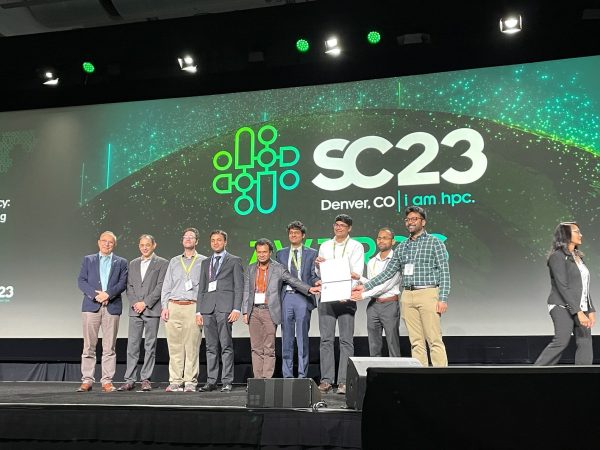
A U-M College of Engineering team led by Vikram Gavini was recently awarded the prestigious ACM Gordon Bell Prize. The honor was presented in recognition of their outstanding achievement for developing and demonstrating an approach that brought near-quantum mechanical accuracy for large systems consisting of tens of thousands of atoms into the range of today’s supercomputers.
The ACM Gordon Bell Prize is awarded each year to recognize outstanding achievement in high-performance computing.
Dr. Gavini and team carried out their largest calculation on the fastest known computer in the world, the U.S. Department of Energy’s Frontier, and they sustained 660 petaflops.
“The ACM Gordon Bell Prize is the most prestigious prize available for high-performance computing,” said Brock Palen, Advanced Research Computing (ARC) director, a division of Information and Technology Services (ITS).
“This is so exciting because it is more than 660 times faster than our entire Great Lakes cluster at perfect efficiency. Their calculation was 10 times the improvement of any prior density-functional theory (DFT) calculation.”
DFT is a method used in physics and chemistry to investigate the electronic structure of many-body systems. These systems can include atoms, molecules, or solids.
“Dr. Gavini is a major user of ARC’s Great Lakes HPC Cluster, and we are so proud of this astonishing achievement.”
Gavini said that any development needs to be carefully tested. “We use ARC’s Great Lakes to test smaller scale systems before moving to larger-scale, production-ready calculations. This testing is critical, and we need the accessibility and speed of Great Lakes to run calibrations and debug our implementations.”
“We use Great Lakes to actively test our implementations.”
For quick-access storage, Gavini and his team use Turbo Research Storage and Data Den Research Archive for longer-term storage. “We generate a lot of data, and storage is important to our work.”
The U-M Research Computing Package was also helpful in defraying some of their HPC and storage costs.
“Thank you to ARC for providing their continual assistance for group members who have been in trenches. This has been a decade-long effort, and ITS/ARC was crucial along the journey,” said Gavini.
Dr. Gavini is a professor of Mechanical Engineering and professor of Materials Science and Engineering, College of Engineering.
